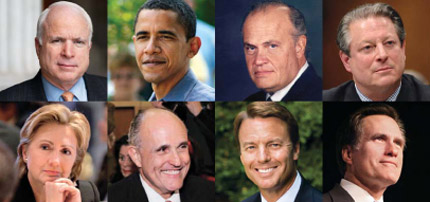insider pov
Anybody’s Game
Wagner Senior Fellow Robert M. Shrum sizes up the 2008 Presidential Players
The 2008 presidential election, it's been observed, is a nearly unique event in modern political history because it's the first campaign since 1952 where no incumbent president or vice-president is running. But that really isn't true. In 1952, Harry Truman, the incumbent, was a yet unannounced candidate when Tennessee Senator Estes Kefauver, the pioneering investigator of the mob, trounced the president in the New Hampshire primary. Truman promptly withdrew.It's the 1920 election that in a real sense mirrors 2008. The campaign was waged amid deep popular dissatisfaction—not with World War I, which had just been won, but with the peace treaty that Democrat Woodrow Wilson had negotiated and the Senate had repudiated. The Democratic candidate, James M. Cox, lost in a historic landslide with only 34 percent of the popular vote to Warren G. Harding's 60 percent.
This year it's the Republicans who are under such stress. Plagued by an increasingly unpopular war in Iraq and scarred by Hurricane Katrina and a slew of ethics questions, they are on the verge of fracturing their age-old habit of nominating the front-runner, the next person "in line," even if he's lost before. The Democrats have higher hopes and a compelling top tier of candidates. Nominating either Hillary Clinton or Barack Obama would signal historic change and present America with a test of conscience. For that matter, the Republicans may very well offer the country the chance to elect the first Mormon or Italian-American president.
However, the 2008 election won't be like 1920 in one critical respect. It won't be a runaway unless the Republicans lose their heads and nominate a fringe candidate, say Texas Representative Ron Paul, whose libertarian ideology has led him to introduce legislation that would outlaw the Federal Reserve, or one of the other minor candidates who are paladins of the far right. In the polls, Democrats hold a substantial lead over Republicans in a generic race for president. It's much closer, however, when the pollsters offer names instead of party labels. While the Bush years have devalued the Republican brand, it's possible that next year America could still vote pretty much like a 50–50 country. Bet on the Democrats, but don't bet it all.

WHO WILL BE THE NEXT PRESIDENT? (CLOCKWISE FROM TOP LEFT): SENATOR JOHN McCAIN; SENATOR BARACK OBAMA;
FORMER SENATOR FRED THOMPSON; FORMER VICE PRESIDENT AL GORE; FORMER GOVERNOR MITT ROMNEY; FORMER
SENATOR JOHN EDWARDS; FORMER MAYOR RUDOLPH GIULIANI; AND SENATOR HILLARY CLINTON.
Early in 2007, the Republican nominee to be was Arizona Senator John McCain. But the maverick decided to rerun the expensive, buttoned-down Bush campaign that wrested the nomination from him eight years before. He's the face of the surge in Iraq, and while he deserves credit for standing by his beliefs, the conservative base still doesn't trust him. He's struggling to raise money and is now a long shot.
Former New York City Mayor Rudolph Giuliani (LAW '68), who's running a 9/11 campaign, rode into a lead in the polls, despite his stance on gay rights and abortion, but his margin seems to diminish each month. Only a Republican party in a state of terminal desperation will nominate someone who disagrees with fundamental conservative views on social issues.
Enter stage right: Fred Thompson, actor turned Tennessee senator, then actor again. Trotted out as a paler clone of Ronald Reagan, Thompson experienced a slow nonstart to his campaign; he may end up having to run for reelection for his old job as DA on Law & Order.
Former Massachusetts Governor Mitt Romney may secure the nomination by process of elimination. He has reengineered his political persona to fit the ideological predisposition of the Republican primary electorate, renouncing the pro-choice stand that helped him win in the bluest of blue states. Ironically, his Mormonism may give credence to the notion that he believes what he's saying now: the flop not the flip.
New York Senator Hillary Clinton's problem is that she looks like the establishment choice in a year of change, so the former First Lady is trying to redefine change as nostalgia for the 1990s. As Bill Clinton said when he was speaking on her behalf and responding to the suggestion that the Clintons were old news, "Yesterday's news was pretty good."
Barack Obama embodies change, but the Illinois Senator will have to satisfy primary voters that there's substance to go with the sizzle. If he does—and there's plenty of time because voters in Iowa and New Hampshire tend to rethink their choices after the first of the year—he could lap Clinton.
Former North Carolina Senator John Edwards' best hope is that the skirmish that flared this summer between Clinton and Obama will escalate into full-scale negative ad war, which risks pushing Democratic primary voters to look for another choice. Fair or unfair, the 2004 vice-presidential nominee now appears the only likely alternative because none of the second-tier candidates as yet have the financial resources or a powerful differentiating message that would let them break through.
The least likely development is the late entry of former Vice President Al Gore. The politician has become a prophet, and the prophet shows no sign of coming down from the mountaintop.
Over his three decade career, Robert M. Shrum has served as senior adviser for the Kerry campaign in 2004 and for Gore in 2000, as well as strategist for more than 30 winning U.S. Senate campaigns, among other major races, which he details in his 2007 book No Excuses: Confessions of a Serial Campaigner (Simon & Schuster). He is currently on leave from his role as a senior fellow at the Robert F. Wagner Graduate School of Public Service.
CLOCKWISE FROM TOP LEFT: PHOTO © JOHN MCCAIN 2008; PHOTO © WWW.BARACKOBAMA.COM; FRED THOMPSON PHOTO © US SENATE HISTORICAL OFFICE; AL GORE PHOTO © US SENATE HISTORICAL OFFICE; PHOTO © ROMNEY FOR PRESIDENT/ABBY BRACK; PHOTO © WWW.JOHNEDWARDS.COM; PHOTO © RUDY GIULIANI PRESIDENTIAL COMMITTEE; PHOTO © HILLARY CLINTON FOR PRESIDENT EXPLORATORY COMMITTEE
Nominating Hillary Clinton or Barack Obama would signal historic change. For that matter, the Republicans may very well offer the country the chance to elect the first Mormon or Italian-American president.







